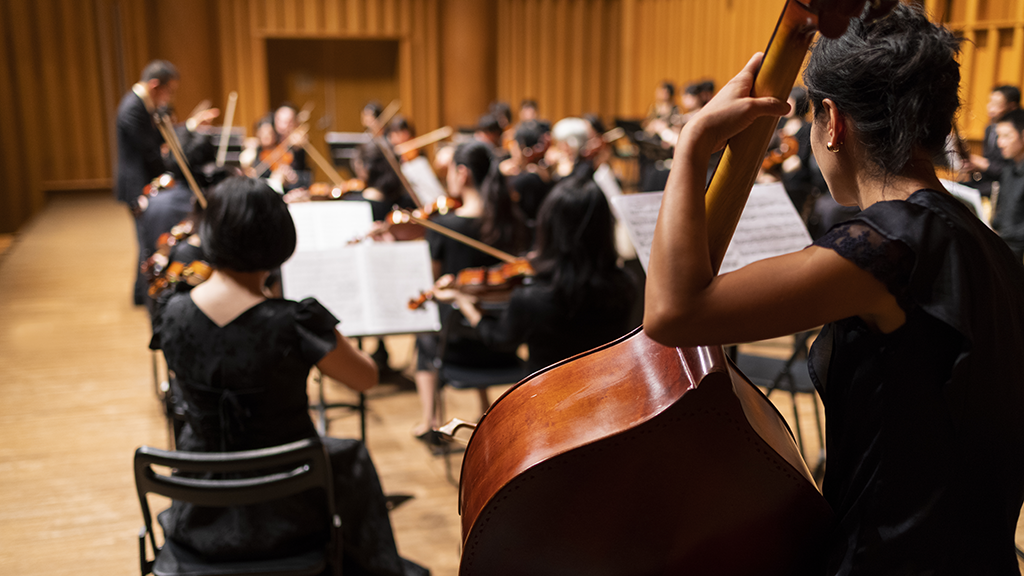Teachers tips to help music students combat stage fright

Date: May 28, 2021
You’re preparing for your performance, but your students – maybe even you! – are starting to feel the effects of stage fright! Simply put, stage fright is performance anxiety. Those with performance anxiety will often focus on the worst case scenarios, worry about failure, and engage in social comparison – even to one’s own high expectations or past performances.
Performance anxiety isn’t uncommon. Artists such as Adele, Mariah Carey, Pablo Casals, Arthur Rubinstein and even Taylor Swift have revealed their own experiences with stage fright. WorldStrides OnStage programs aims to provide you with all the tools you need for a successful festival.
Here are 8 tips for music teacher and directors to help their student musicians combat stage fright
Validate the experience of anxiety
Acknowledge that students may be anxious, but express to them that you know they can achieve their goals. Focus on the fact that you want to experience and enjoy this performance with them. Give them permission not to be in “critique mode” and encourage them to try to accept their feelings of anxiety.
Create an environment where it’s okay to make mistakes
Bolster students’ self-confidence by valuing each student’s contribution and discouraging the notion that mistakes define a student. Acknowledge the bravery students display in taking on a challenge. Reinforcing good moments and good approximations throughout the rehearsal process not only helps at the time, but also gives those who are anxiety-prone memories of positive things occurring within a musical context. The memories of success can remind them during a performance that they can do it
Focus on the experience of the present
Instead of allowing students to obsess about performance as something to be judged, refocus them on why they got into the arts to begin with. Why do they love music in general or parts of the music they’ve worked on? What meaning do they take from this music?
Additionally, do group breathing exercises prior to a performance. Breathing as a group encourages bonding, ensemble cohesion, and reduction of anxiety, but also encourages being in the moment.
Give your students an interactive pep-talk!
Before your performance, have each student name their favourite piece, a treasured moment from rehearsal, or a quick reason they enjoy music. Or, you can have them do something physical before performing! Whether it’s taking a walk, or a countdown shake-out, this helps students shake off their nerves and focus on their performance.
Encourage students to identify negative thoughts
Identifying when one is having a negative thought and responding with understanding can be helpful. For example, if your students are learning a new piece of music that they find difficult, encourage them to consider the idea it’s a challenge and that they are capable of conquering it. Reflect with them on previous success with difficult pieces.
Take away the power of the audience
Audience members attend performances to support the performers – they want the people they’ve come to see and hear to do well! Discuss with students that certainly, some audience members may have an expertise in the arts, but the majority is simply there to be supportive of the performers and the art.
Practice in as similar an environment as possible to the performance
Practicing walking on stage, visualizing the audience, and running songs in full all help to ground students in the reality of what a performance will be like. If you can, set-up a pre-festival concert. Invite adjudicators and run it similar to the festival format your students will experience. There is no actual competitive pressure and it’s a lower stakes performance, but your students will have a trial run.
Practice healthy self-care
Encourage students to engage in their favourite hobbies. This could be drawing, exercising, having dinner with friends – whatever they love to do in their spare time. Make sure performers get enough sleep, nutrition, and hydration ahead of their performance.
We hope these tips will be helpful in reducing performance anxiety at your next music performance! Learn more about our WorldStrides Onstage programs.
Acknowledgements:
Clinical psychologist and choral musician Dr. Latasha Nadasdi, currently a Post-Doctoral Fellow at the University of Michigan, was interviewed for this article.
Additional information was gathered from:
Esposito, J. Conquering Stage Fright. Anxiety and Depression Association of America. Retrieved from https://www.adaa.org/understanding-anxiety/social-anxiety-disorder/treatment/conquering-stage-fright.
Goldberg, J. (reviewer). (2015). Stage Fright (Performance Anxiety). WebMD. Retrieved from http://www.webmd.com/anxiety-panic/guide/stage-fright-performance-anxiety?page=1.
Lybi, M. (2005). Fighting Stage Fright. Psychology Today. Retrieved from https://www.psychologytoday.com/articles/200512/fighting-stage-fright.


